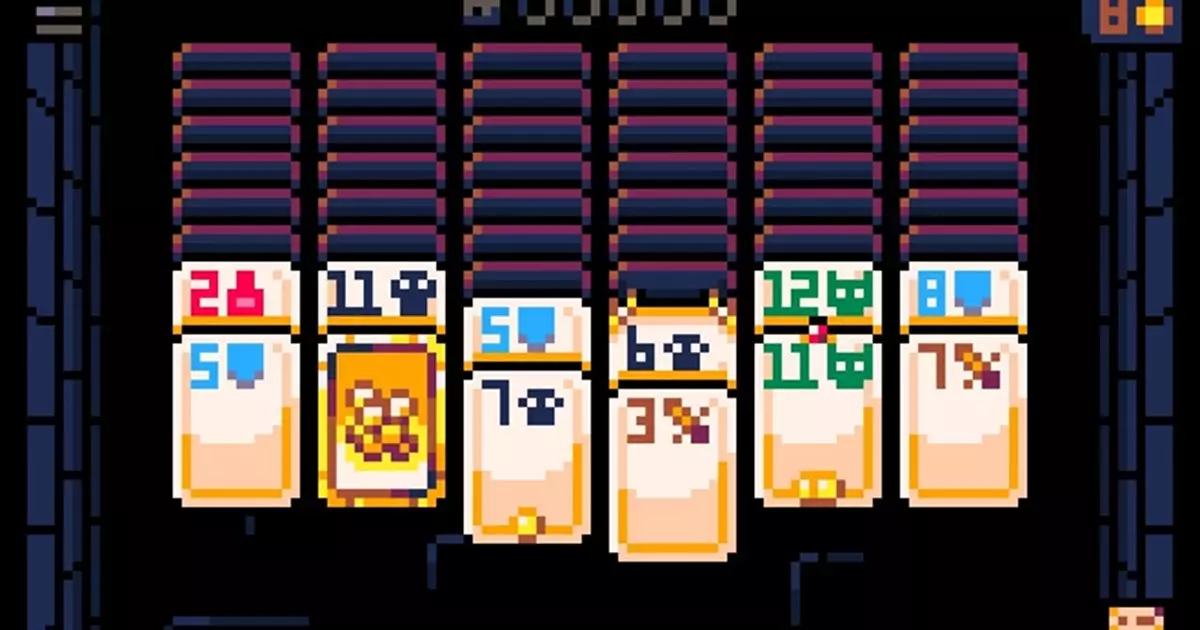In the realm of indie game development, fresh concepts often emerge that challenge the traditional limitations of established genres. One such intriguing game is **Solitomb**, crafted by Jakub Wasilewski. This unique solitaire-based dungeon crawler offers a refreshing spin on gaming mechanics, utilizing classic card game elements to create an engaging experience. Unlike conventional grand strategy games that can be bogged down by overwhelming micromanagement, Solitomb manages to balance complexity and accessibility, providing players with a strategic puzzle that can be enjoyed in short sessions, appealing to both casual players and strategy aficionados alike.
At its core, Solitomb reimagines the standard solitaire format, integrating it into a dungeon crawler setting. This intricate marriage of genres begins with a familiar layout: cards are laid out in stacks, with some turned face-up for visibility. However, once players delve deeper, the innovations reveal themselves. Each card represents various essential elements for combat, including monsters to combat, defensive shields, and potent potions. The numeric values on the cards correlate directly with their effectiveness, requiring players to think critically about their choices.
Players must execute their strategy by forming stacks of up to five cards, adhering to specific rules of placement based on card values. This innovative mechanic encourages careful planning and resource management as players prepare for incoming battles against increasingly formidable foes. The overarching aim? Clear pathways, defeat various enemies, and ultimately navigate through the dungeon. Initial impressions may suggest conceptual abstraction; however, the elegant simplicity of the rules evolves into a rich strategic experience as players engage with the game.
Combat in Solitomb is a dynamic affair, pushing players to quickly make tactical decisions. To illustrate, combating a monster with a strength of five requires a delicate balance: pairing it with a sword of equivalent strength, accompanied by a shield and a potion for added security. Strategic foresight becomes crucial as players continuously assess their resources, opting for optimal combinations while avoiding needless engagements that could deplete their health or attack options.
The game introduces layers of complexity beyond mere numeric matching. For instance, players face the looming threat of a vexed demon in the dungeon who grows impatient with delayed actions. The urgency to act adds thrilling pressure that amplifies the strategic intensity. Successful combos yield bonuses, and players must navigate between maximizing immediate gains and planning for future encounters. Each turn becomes a delicate dance, highlighting the nuanced decision-making that underpins the experience.
Upon initiating a run, players are prompted to select a character class, each armed with unique passive abilities and special skills that can significantly tilt the scales of battle. This choice not only adds a layer of personalization but also informs strategic planning, as different characters may synergize better with specific card types or playstyles.
As players progress through the dungeon’s levels, they encounter opportunities to visit a shop offering an array of new cards and upgrades. This inclusion creates a sense of growth and reward, with the potential for players to refine their strategies based on their experiences in previous levels. It’s a mechanism that invites repeated engagement, ensuring the gameplay remains fresh and compelling.
It’s essential to acknowledge that Solitomb currently exists as a pay-what-you-want prototype. Yet, this is not a mere gimmick; it serves a primary purpose: funding the development of a more expansive version. This approach fosters a community-driven belief in the game’s potential, allowing players to contribute to its evolution. The vision behind Solitomb is both daring and commendable, suggesting a groundbreaking future for the game, mirroring the success of Wasilewski’s previous project, Slipways.
While Solitomb invites comparisons to established titles, it firmly carves out its niche through innovative design. It already boasts profound strategic depth, cleverly melding solitaire mechanics with a dungeon crawling narrative. By encouraging creativity in decision-making and rewarding strategic planning, Solitomb ultimately stands as a testament to the transformative power of indie gaming and the endless possibilities within the digital realm. Players interested in a unique, cerebral experience should seize the opportunity to explore this emerging masterpiece.


Leave a Reply